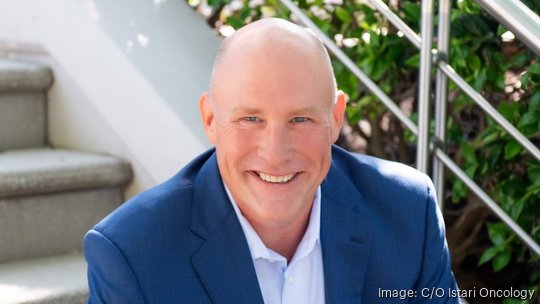
The pieces are starting to fall into place at a Duke University spin-out studying how technology derived from a polio vaccine might cure hard-to-treat cancers.
Boosted by a recent $43.4 million funder, Durham-based Istari Oncology has the cash runway to get it through “at least the first half of next year,” said CEO Matt Stober – enough time for data to come back on a series of studies for its treatments.
But the challenges, too, are stacking up in the background. The stakes are high and getting higher – as the startup decided this week to expand its oncology trial.
With Covid causing capacity constraints across the entire industry, it’s a crazy time to be building a company, Stober admitted.
But cancer doesn’t wait – as Stober knows personally.
Stober’s father died of esophageal cancer, so he’s seen first hand the devastating consequences of cancer – and its treatments’ side effects.
With Istari, Stober's not just fallen “in love” with the science, but with the mission.
Stober, who took the CEO seat last year, has been tasked with taking the firm to the next level – outside of academia and into an actionable phase where its technology can really make a difference.
But Covid complications are causing administrative challenges. Istari isn’t facing the same Covid-related patient enrollment entanglements as some other clinical-stage pharma firms – but it’s seeing competition for capacity.
“As you might imagine, with all the resources being dedicated to manufacturing Covid vaccines, it’s put a lot of pressure on the biologics manufacturing third party network,” Stober said. Much of the industry’s capacity is being earmarked for Covid-19 vaccines, making it more difficult to fill vials and source ingredients. Istari, which partners with Fujifilm Diosynth Biotechnologies for its manufacturing, has not seen a major impact when it comes to executing clinical trials. But the costs have gone up as a result of the capacity constraints. Stober estimates it’s costing 25 percent more than it would have pre-Covid.
“We’ve been fortunate that we’ve been able to have the financial resources to absorb those cost increases,” he said.
The product was developed over several years in a Duke University laboratory – an investigational therapy that started with a genetically modified polio virus. The immunotherapy – called PVSRIPO – targets “nearly all solid tumors,” Stober said.
Already the platform is being tested to treat patients with advanced bladder cancer.
Last week, the firm announced plans to expand its trial even further, investigating PVSRIPO as a potential treatment for head and neck cancer, which has impacted more than 66,000 people in the United States in 2021 alone.
Istari was founded in 2014, but really got rolling last year with Stober’s hire.
Today it has 47 employees and is actively hiring. Its growth will mirror its clinical success, Stober predicts. The more positive results that churn out of its laboratories, the more employees will be needed to help build the platform. And Stober has a bold vision – one that goes past bladder and head and neck cancers. He sees a wide array of oncology applications – he said the mission is just getting started.
One major advantage researchers are seeing with Istari’s treatment? Minimal side effects compared to many other treatments, Stober said. That could be welcome news for patients throughout the globe.
Amanda Hollinger, executive director of the Head & Neck Cancer Alliance, stressed the importance of Istari’s mission.
“As we continue to focus on advancing prevention, detection, treatment, and rehabilitation of people with head and neck cancer, we will be closely watching the progress of Istari’s head and neck sub-study with great anticipation and optimism,” she said in a prepared statement.
Istari was founded by Darrell Bigner and Matthias Gromeier, two physicians, researchers and professors at Duke University Medical Center. According to the university, preclinical work is underway, researching the technology in other targets, such as lung, breast and pancreatic cancer.


